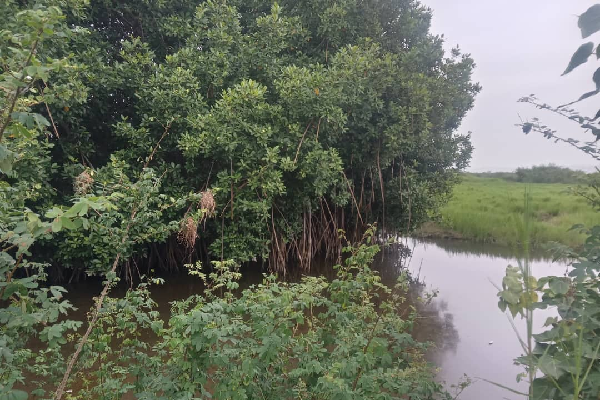
Destruction of mangroves: A danger to coastal livelihoods - Expert
The Operations Manager of Wetland of the Wildlife Division of the Forestry Commission, Dickson Agyeman, has expressed concern that the destruction of mangroves habitats poses grave danger to the environment and the livelihoods of coastal communities in the country.
He said mangroves help regulate climate as well as served as spawning areas for different fish species, which many coastal communities depended on for their livelihood.
Mangroves, he explained, could absorb carbon dioxide five times higher than that of tropical upland forest due to strong carbon storage in the soil.
Mangroves are a group of tropical or shrubs that grow in dense thickets or forests along tidal estuaries with exposed roots that serve as buffer between marine and terrestrial communities by protecting shorelines from damaging winds, waves and floods.
Mr Agyeman was speaking to a team of environmental journalists who were conducted on some mangroves habitats and Ramsar Sites in the Greater Accra and Volta Regions.
The tour of the mangroves and Ramsar sites was organised by International Union for Conservation of Nature (IUCN) in collaboration with the Media Platform on Environment and Climate Change (MPEC) as part of activities marking this year's celebration of International Mangrove Day in Ghana.
The tour was meant to enable the journalists to create awareness about the status of the country’s mangrove forests and Ramsar sites. Areas visited included Densu Delta Ramsar Site, Korle Lagoon, Kpeshie Wetland, and Anglo-Keta lagoon complex.
Mr Agyeman cited unsustainable exploitation of mangroves, inadequate management measures to protect the remnant species, degradation of mangrove habitats by sea waves, filling of habitats, conversion of habitat to other uses, population and economic pressure, and poverty within mangrove communities were some of the factors causing the depletion of mangroves sites in the country.
Similarly, he mentioned inadequate alternative livelihood options, poor governance measures at all levels, inadequate public education and awareness as well as emerging issues such as petroleum and gas exploration, exploitation activities, including illegal mining (galamsey) and climate change as other factors responsible for the depletion of mangroves habitats in the country.
For Mr Agyeman, there were no laws or policies in the country to govern mangrove ecosystem management, pointing out that government had not out rightly acquired the mangroves areas, hence owners of such areas undertake activities which unfortunately degrade the mangroves habitats.
He has, therefore, advocated for the development of a comprehensive policy framework to help protect mangroves at Ramsar sites across the country, saying “There is an urgent need to develop policies that will govern the sustainable use of mangrove in Ghana.”
In addition, he noted, “These policies should take both bottom up and top-down approaches,” stressing that in addition the policies, local policies on mangroves inclusion in policy framework of mangrove project should be initiated at the district level.
Division
Mr Agyeman said wetlands had been divided into two parts—the core and buffer zone, explaining that fishing activities were allowed in both zones.
However, he said, harvesting of mangroves in the core zones were not allowed, adding that due to industrial and human pollution, the mangroves were not growing as it was supposed to.
He said blocked channels that allowed blackish salty water to water mangroves sites had slowed the development of mangroves forests, explaining that mangroves depended on brackish water—water that is saltier than fresh water but not as sea water.
He has appealed to industries and the citizenry to desist from converting mangroves sites into human habitats and also polluting the lagoons and other wetland areas in the country.
For Mr Agyeman, there was the need to build the capacities of communities to sustainably manage mangrove resources and add value to mangrove products other than using it as fuel wood.
